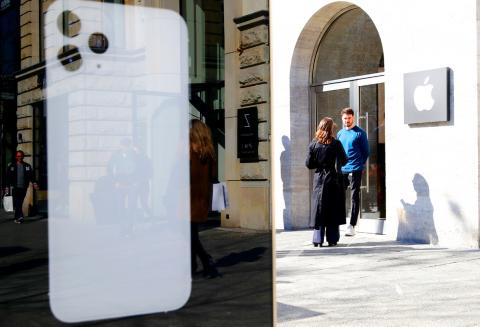Apple Inc is closing all of its stores outside China until March 27 in a bid to slow the spread of the COVID-19 outbreak, chief executive officer Tim Cook has said.
Cook said the firm had learned from steps taken in China, where the tech giant has just reopened its retail stores.
“One of those lessons is that the most effective way to minimize risk of the virus’ transmission is to reduce density and maximize social distance,” he said in a statement late on Friday. “As rates of new infections continue to grow in other places, we’re taking additional steps to protect our team members and customers.”

Photo: EPA-EFE
Apple’s online store would remain open, but office staff outside China would be working remotely if possible, Cook added.
The California-based firm has about 500 stores in 24 countries around the world.
Despite the closures, Cook said hourly workers would continue to be paid as normal.
Apple had expanded its leave policy “to accommodate personal or family health circumstances created by COVID-19,” including caring for a sick loved one, mandatory quarantine or childcare due to school closures, he said.
Meanwhile, Microsoft Corp on Friday announced that cofounder Bill Gates has left its board of directors to devote more time to philanthropy.
The 64-year-old stopped being involved in day-to-day operations at the firm more than a decade ago, turning his attention to the foundation he launched with his wife, Melinda Gates.
Bill Gates served as chairman of Microsoft’s board of directors until early in 2014 and has now stepped away entirely, the Redmond-based tech giant said.
“It’s been a tremendous honor and privilege to have worked with and learned from Bill over the years,” Microsoft chief executive and company veteran Satya Nadella said in a news release.
“Bill founded our company with a belief in the democratizing force of software and a passion to solve society’s most pressing challenges; and Microsoft and the world are better for it,” he said.
Nadella said Microsoft would continue to benefit from Bill Gates’ “technical passion and advice” in his continuing role as a technical adviser.

The US government has signed defense cooperation agreements with Japan and the Philippines to boost the deterrence capabilities of countries in the first island chain, a report by the National Security Bureau (NSB) showed. The main countries on the first island chain include the two nations and Taiwan. The bureau is to present the report at a meeting of the legislature’s Foreign Affairs and National Defense Committee tomorrow. The US military has deployed Typhon missile systems to Japan’s Yamaguchi Prefecture and Zambales province in the Philippines during their joint military exercises. It has also installed NMESIS anti-ship systems in Japan’s Okinawa

‘WIN-WIN’: The Philippines, and central and eastern European countries are important potential drone cooperation partners, Minister of Foreign Affairs Lin Chia-lung said Minister of Foreign Affairs Lin Chia-lung (林佳龍) in an interview published yesterday confirmed that there are joint ventures between Taiwan and Poland in the drone industry. Lin made the remark in an exclusive interview with the Chinese-language Liberty Times (the Taipei Times’ sister paper). The government-backed Taiwan Excellence Drone International Business Opportunities Alliance and the Polish Chamber of Unmanned Systems on Wednesday last week signed a memorandum of understanding in Poland to develop a “non-China” supply chain for drones and work together on key technologies. Asked if Taiwan prioritized Poland among central and eastern European countries in drone collaboration, Lin

Renewed border fighting between Thailand and Cambodia showed no signs of abating yesterday, leaving hundreds of thousands of displaced people in both countries living in strained conditions as more flooded into temporary shelters. Reporters on the Thai side of the border heard sounds of outgoing, indirect fire yesterday. About 400,000 people have been evacuated from affected areas in Thailand and about 700 schools closed while fighting was ongoing in four border provinces, said Thai Rear Admiral Surasant Kongsiri, a spokesman for the military. Cambodia evacuated more than 127,000 villagers and closed hundreds of schools, the Thai Ministry of Defense said. Thailand’s military announced that

CABINET APPROVAL: People seeking assisted reproduction must be assessed to determine whether they would be adequate parents, the planned changes say Proposed amendments to the Assisted Reproduction Act (人工生殖法) advanced yesterday by the Executive Yuan would grant married lesbian couples and single women access to legal assisted reproductive services. The proposed revisions are “based on the fundamental principle of respecting women’s reproductive autonomy,” Cabinet spokesperson Michelle Lee (李慧芝) quoted Vice Premier Cheng Li-chiun (鄭麗君), who presided over a Cabinet meeting earlier yesterday, as saying at the briefing. The draft amendment would be submitted to the legislature for review. The Ministry of Health and Welfare, which proposed the amendments, said that experts on children’s rights, gender equality, law and medicine attended cross-disciplinary meetings, adding that